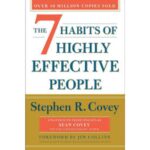LISTEN NOW
Outline: The 7 Habits of Highly Effective People by Stephen R. Covey
Outline
Expand to Read ...
Core Concept
- Premise: The book outlines seven lifelong habits that build a successful, fulfilling life by aligning actions with principles.
- Focus: Emphasizes changing internal perspectives (character ethics) rather than relying on external, quick-fix tactics (personality ethics).
- Purpose: Applicable for personal and professional growth, the habits aim to foster independence, interdependence, and long-term effectiveness.
Key Habits
- Take Initiative:
- Be proactive, take responsibility, and act based on values rather than reacting to circumstances.
- Envision the Life You Want:
- Define long-term goals, principles, and roles. Align daily actions with this vision.
- Prioritize Important Over Urgent:
- Focus on tasks that contribute to long-term goals rather than reacting to urgent but unimportant demands.
- Seek Mutual Benefits:
- Approach negotiations and relationships with a win/win mindset to achieve collaborative success.
- Listen and Understand the Other First:
- Practice empathic listening to understand others’ perspectives before expressing your own.
- Collaborate to Create Possibilities:
- Work together to create outcomes greater than the sum of individual contributions.
- Practice Self-Renewal:
- Regularly rejuvenate yourself physically, mentally, emotionally, and spiritually to maintain effectiveness.
Part 1: Paradigm Shift
- Concept: To change behavior and outcomes, shift your paradigm (the way you perceive the world).
- Framework:
- Awareness of current paradigms.
- Center perspectives on universal principles (e.g., fairness, integrity).
- Actively shift paradigms to align with desired behaviors.
Part 2: Independence (Habits 1-3)
Habit 1: Take Initiative
- Description: Proactively choose thoughts and actions to address what you can control and accept what you can’t.
- Strategies:
- Identify actionable problems and address them.
- Accept unchangeable realities and learn from mistakes.
- Build a strong self-image to guide choices.
- Use language and commitments that reinforce proactive behavior.
Habit 2: Envision the Life You Want
- Description: Define personal values, roles, and goals to guide decisions.
- Steps:
- Visualize the end of your life and identify the legacy you want.
- Create a personal mission statement or manifesto.
- Regularly review and update your vision and goals.
Habit 3: Prioritize Important Over Urgent
- Description: Use the urgent-important matrix to allocate time to meaningful tasks (Category 2).
- Strategies:
- Weekly planning focused on long-term goals.
- Delegate tasks to free time for critical activities.
- Use tools like the Eisenhower Matrix or Getting Things Done (GTD) for daily task management.
Part 3: Interdependence (Habits 4-6)
Habit 4: Seek Mutual Benefits
- Description: Strive for win/win solutions in negotiations and relationships.
- Key Elements:
- Abundance mentality: Success is not a zero-sum game.
- High levels of trust and empathy.
- Clear understanding of mutual goals.
Habit 5: Listen and Understand the Other First
- Description: Use empathic listening to deeply understand others’ perspectives.
- Stages:
- Mimic words (basic listening).
- Rephrase content.
- Reflect emotions.
- Combine logic and emotion for full understanding.
- Benefits:
- Builds trust.
- Improves collaboration and problem-solving.
Habit 6: Collaborate to Create Possibilities
- Description: Foster trust and open communication to achieve creative, synergistic outcomes.
- Principles:
- Value differences as opportunities for growth.
- Balance trust and candor in relationships.
- Develop internal synergy (balance of reason and emotion).
Part 4: Self-Renewal (Habit 7)
Habit 7: Practice Self-Renewal
- Description: Maintain physical, mental, emotional, and spiritual health to sustain effectiveness.
- Dimensions:
- Physical: Exercise, eat well, rest.
- Spiritual: Reflect, meditate, engage in meaningful activities.
- Mental: Read, write, learn.
- Emotional/Social: Build relationships and practice the other habits.
Additional Concepts
- Interdependence and Maturity Continuum:
- Progress from dependence to independence to interdependence.
- Interdependence is key for collaboration and effectiveness.
- P/PC Balance:
- Balance productivity (P) with capacity (PC) to sustain long-term results.
How to Apply the Habits
- Evaluate Current Paradigms:
- Identify biases or perspectives shaping behaviors.
- Focus on Principle-Centered Living:
- Align actions with universal values.
- Develop a Plan:
- Use tools like personal mission statements and time management matrices.
- Commit to Lifelong Learning:
- Revisit and refine habits regularly.
Impact
Covey’s framework fosters personal and professional success by helping individuals:
- Align their actions with core principles.
- Build meaningful relationships through empathy and collaboration.
- Sustain long-term growth through balanced self-renewal.

 Buy on Amazon
Buy on Amazon